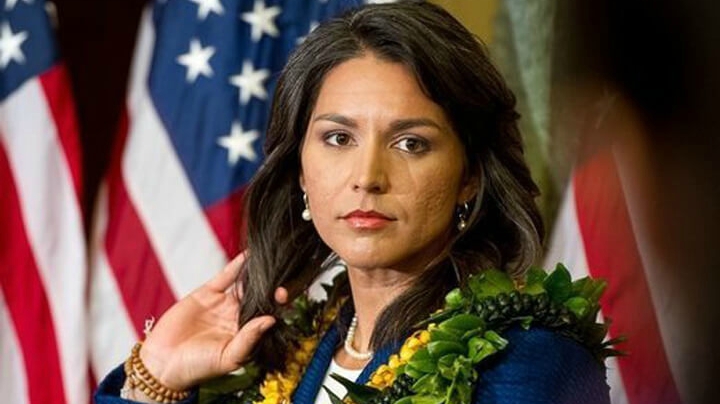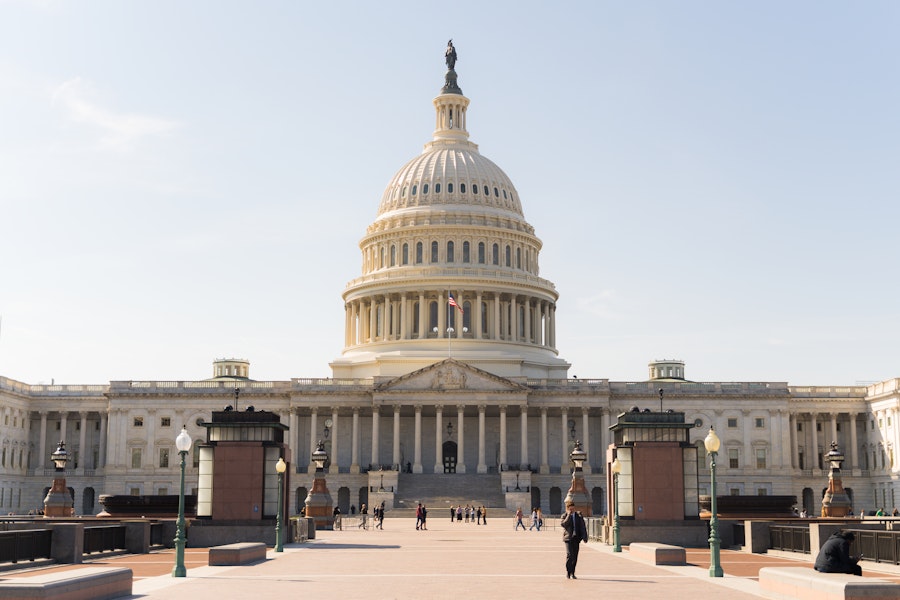Jason Kander, the 36 year old Democrat and former marine who ran for Senate in 2016, has not slowed down since nearly defeating Republican incumbent Roy Blunt in deep-red Missouri.
After becoming somewhat of a grassroots superstar, surprising Democratic pollsters with his massively successful video advertising campaign (in which he assembled an automatic rifle blindfolded while defending background checks), and nearly winning a seat that a Democrat hadn’t occupied since 1986, Kander is currently making the temporary transition to progressive activism and advocacy.
[embedyt] https://www.youtube.com/watch?v=-wqOApBLPio[/embedyt]
Now featured regularly on millennial political podcasts, such as “Pod Save America,” and actively touring the nation to encourage voter turnout, Kander appears to be laying the groundwork for an ambitious and potentially groundbreaking future campaign.
Tulsi Gabbard, also a 36 year-old veteran, is one of the most ambitious, progressive, voraciously independent Democrats in Congress. Hailing from Hawaii, Gabbard catapulted onto the political stage in 2012 as one of the youngest women to be elected to Congress, and has continued to break boundaries and disrupt political conventions ever since.

Passionately championing millennial causes like marijuana legalization and non-interventionism (both of which the old guard of the Democratic party has pursued reluctantly), while also gaining respect across the aisle for her strong support of Second Amendment rights, military funding, and more recently, her willingness to meet with President Donald Trump to discuss bipartisan foreign policy, Gabbard seems to be equally revered by prominent figures on the left and right.
“Having someone like Tulsi to work with is a pleasure,” said Republican Representative Mark Meadows of North Carolina, in an interview with Vogue. “There are a number of issues on which we disagree, but she’s not one for partisan rhetoric.”
Subsequently, Gabbard has become somewhat of a hero for the Sanders wing of the Democratic Party, particularly due to her anti-establishment leanings. Calling out the Democratic National Committee (DNC) for “casting out progressives,” and promising to lead the charge on Vermont Senator Bernie Sanders’s $15 minimum wage proposal in Congress have further cemented her reputation as the most unique and vibrant voice in progressive politics.
Both Gabbard and Kander have shown a remarkable ability to connect with conservative and independent voters while still maintaining their progressive reputations; a skill that will prove to be essential if Democrats are to win back the Rust Belt in 2020.
Additionally, both have experienced exponential success and bipartisan popularity at a time when their party and its leaders have largely experienced the opposite.
So what is the fundamental difference between these grassroots heroes and the mainstream figures that Democratic pundits continue to promote as possible 2020 Presidential contenders?
For one, unlike the “The Top 15 possible 2020 nominees,” listed by the well meaning, but establishmentarian Washington Post, both have built their political careers from scratch with little help from major party fundraisers.
Gabbard, for example, relied entirely on a small army of doorknocking volunteers, made up of mostly young voters and veterans, when she campaigned against longstanding party icon, Mufi Hannemann, in the Democratic primary for Hawaii’s Second District.
“No one from the D-triple-C (the Democratic Congressional Campaign Committee) came and recruited me to run for Congress,” she said in an interview with The New Yorker. “So my situation may [have been] different from others, who have relied heavily on Party support from the beginning.”

What candidates that campaign as underdogs lack in financial resources and endorsements, they must make up for in charisma and a deep understanding of their constituents values. Being forced to rely entirely on individual voters instead of top fundraisers deepens candidates’ understanding of what makes their constituents tick. This gives them a hidden weapon in the form of personal experience that many incumbent establishment party figures… ahem… Kirsten Gillibrand and Corey Booker… seem to have largely lost.
Another factor that may contribute to Kander and Gabbard’s success and popularity is that both reflect the age range that has proven to be the most successful for Democrats in the past (both Clinton and Obama were under 50 when they first ran for President).
Democrats do not necessarily have to be young in order to motivate the youth base. After all, just look at the unprecedented success of Bernie Sanders’ campaign. However, considering the Democratic platform is built in large part around the values of young people, particularly regarding higher education, affordable living, and financial support, it certainly helps to be able to understand and relate to these issues on a personal level.
Another distinguishing factor between Kander and Gabbard and the party establishment is that neither have made Trump opposition the centerpiece of their campaign strategy.
Most notable Democrats have attempted to capitalize on Trump’s low approval ratings by making use of every opportunity to bash the President and his supporters monolithically, in the process, alienating Obama-Trump voters that Democrats must win over in order to take back states like Pennsylvania, Michigan, and Wisconsin. However, Kander and Gabbard have made room in their rhetoric for Trump supporters by spending less time attacking the President and more time addressing Democratic policies that are the most attuned to the interests of white working class voters, like support for minimum wage, better work conditions, and improved healthcare.
“I think it makes a difference when [a candidate] acknowledges that Congress needs to do more than just complain about the President,” said Kander at a Progressive Iowa rally in 2016.
Both Gabbard and Kander have also focused on establishing personal connections with their voters and supporters, shifting the focus from potential political disagreements.
“People at home don’t care whether you’ve got a D or R in front of your name. They want you to get things done,” said Gabbard, in the same Vogue piece as Meadows.
“Voters will forgive you for believing something that they don’t agree with, so long as they know that you believe it will help them,” said Kander, echoing her statement.

Many of the establishment candidates expected to fill the leadership void in the Democratic Party such as Elizabeth Warren (D-MA), Cory Booker (D-NJ), and Kirsten Gillibrand (D-NY), lack the charisma, grassroots chops, and bipartisan popularity of next-gen Democrats like Kander and Gabbard. (Photo via the Hill)
While I personally doubt Kander, Gabbard, or any other young, fresh faced progressive with an anti-establishment flair will be nominated for President in 2020, the future of the Party does rest in the hands of this new breed of Democrat.
Afterall, as the DNC scrambles to rediscover the identity of a largely divided party, it is only a matter of time before convention and tradition succumb to innovation and progress.










